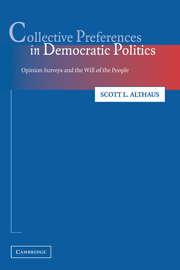Crossref Citations
This Book has been
cited by the following publications. This list is generated based on data provided by Crossref.
Fraile, Marta
2001.
Controlling Governments.
p.
131.
Somin, Ilya
2004.
Pragmatism, democracy, and judicial review: Rejoinder to Posner.
Critical Review,
Vol. 16,
Issue. 4,
p.
473.
Goot, Murray
2005.
Politicians, public policy and poll following: Conceptual difficulties and empirical realities.
Australian Journal of Political Science,
Vol. 40,
Issue. 2,
p.
189.
Jerit, Jennifer
Barabas, Jason
and
Bolsen, Toby
2006.
Citizens, Knowledge, and the Information Environment.
American Journal of Political Science,
Vol. 50,
Issue. 2,
p.
266.
Mondak, Jeffery J.
Carmines, Edward G.
Huckfeldt, Robert
Mitchell, Dona‐Gene
and
Schraufnagel, Scot
2007.
Does Familiarity Breed Contempt? The Impact of Information on Mass Attitudes toward Congress.
American Journal of Political Science,
Vol. 51,
Issue. 1,
p.
34.
Erikson, Robert S.
2007.
DOES PUBLIC IGNORANCE MATTER?.
Critical Review,
Vol. 19,
Issue. 1,
p.
23.
Page, Benjamin I.
2007.
IS PUBLIC OPINION AN ILLUSION?.
Critical Review,
Vol. 19,
Issue. 1,
p.
35.
Hellwig, Timothy
2007.
Globalization and Perceptions of Policy Maker Competence.
Political Research Quarterly,
Vol. 60,
Issue. 1,
p.
146.
Griffin, John D.
and
Flavin, Patrick
2007.
Racial Differences in Information, Expectations, and Accountability.
The Journal of Politics,
Vol. 69,
Issue. 1,
p.
220.
Caplan, Bryan
2007.
Beyond conventional economics: The limits of rational behaviour in political decision making.
Public Choice,
Vol. 131,
Issue. 3-4,
p.
505.
Quirk, Paul J.
2007.
WHEN THE PRESIDENT SPEAKS, HOW DO THE PEOPLE RESPOND?.
Critical Review,
Vol. 19,
Issue. 2-3,
p.
427.
Tóka, Gábor
and
Popescu, Marina
2007.
Inequalities of Political Influence in New Democracies.
International Journal of Sociology,
Vol. 37,
Issue. 4,
p.
67.
Elster, Jon
and
Landemore, Hélène
2008.
IDEOLOGY AND DYSTOPIA.
Critical Review,
Vol. 20,
Issue. 3,
p.
273.
Althaus, Scott L.
and
Trautman, Todd C.
2008.
The Impact of Television Market Size on Voter Turnout in American Elections.
American Politics Research,
Vol. 36,
Issue. 6,
p.
824.
Averbeck-Lietz, Stefanie
2008.
Stéphane Olivesi (Hrsg.): Sciences de l’information et de la communication. Objets, savoirs, discipline.
Publizistik,
Vol. 53,
Issue. 1,
p.
122.
Shapiro, Robert Y.
and
Bloch‐Elkon, Yaeli
2008.
DO THE FACTS SPEAK FOR THEMSELVES? PARTISAN DISAGREEMENT AS A CHALLENGE TO DEMOCRATIC COMPETENCE.
Critical Review,
Vol. 20,
Issue. 1-2,
p.
115.
Devine, Karen
2008.
Stretching the IR Theoretical Spectrum on Irish Neutrality: A Critical Social Constructivist Framework.
International Political Science Review,
Vol. 29,
Issue. 4,
p.
461.
BARABAS, JASON
2008.
Presidential Policy Initiatives: How the Public Learns about State of the Union Proposals from the Mass Media.
Presidential Studies Quarterly,
Vol. 38,
Issue. 2,
p.
195.
Wittman, Donald
2008.
THE MYTH OF THE RATIONAL VOTER?.
Critical Review,
Vol. 20,
Issue. 3,
p.
359.
Page, Benjamin I.
2008.
IN DEFENSE OF POLICY POLLING: REJOINDER TO BISHOP.
Critical Review,
Vol. 20,
Issue. 1-2,
p.
159.





